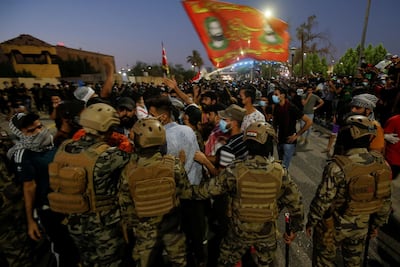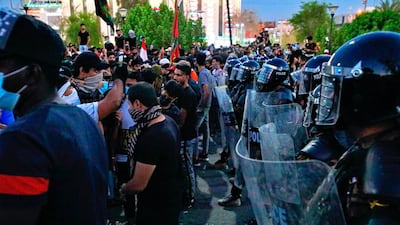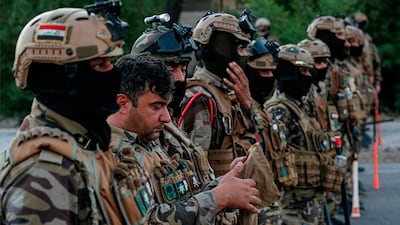Iraqi Prime Minister Mustafa Al Kadhimi arrived in Basra to meet with security officials on Saturday night, just hours after returning from his official visit to the US, following days of protests in the southern city over the killing of prominent activists.
The prime minister was accompanied by a high-ranking security delegation that included the defence minister, and the heads of the national security agency and Counter-Terrorism Services, a government official told the Iraq news agency.
Anger over the assassinations of two activists boiled over on Friday as protesters torched parliament offices in Basra, following days of inaction by the government over the killings.
Demonstrators burnt the outer gate of the entrance to the building housing the Iraqi parliament's local offices for Basra province, the area that produces the lion’s share of Iraq’s oil.
It was the most significant incident against the government in Basra since mass anti-establishment demonstrations began in October, when tens of thousands took to the streets in Baghdad and across the south to decry government corruption. Protests also erupted in Basra in the summer of 2018.
Demonstrators clashed with security forces, hurling Molotov cocktails. At least eight security personnel were injured in the clashes, said Ali Al Bayati, spokesman for the semi-official Independent High Commission for Human Rights.
Protesters in Basra have blamed Iran-backed Iraqi militias for attacks on activists.
Abbas Al Darraji, one of the most prominent protesters based in Basra, said demonstrators sought to increase the pressure on local officials.
“Yesterday, we poured into the parliament building in Basra to pressure Basra MPs to sign the dismissal of Basra's governor Asaad Al Eidani,” he said.
Many on the streets of the southern city blame local politicians for failing to take action to address their grievances over lack of jobs, poor public services, corruption and police brutality despite months of protests.

“We ask the Basra MPs to sign a paper to [enact the] resignation of Al Edani, they see injustice but have made no tangible measures to help the people for years,” said Mr Al Darraji.
Protesters gathered after two activists were gunned down and several others injured in attacks in the city in the past week.
Activist Reham Yacoub was killed in Basra on Wednesday by unidentified gunmen. She was a respected activist who had been active in the October demonstrations.
Days earlier, activist Tahseen Osama was killed by armed men. That killing prompted dozens of protesters to take to the street, and police responded by firing live rounds at them.
“Sooner or later, we must remove the governor from the political circle just like dismissing the Basra police chief who allowed the killing of protesters in the city,” Mr Al Darraji added.

Prime Minister Mustafa Al Kadhimi last Monday removed Basra police chief Rasheed Fleah over the violence.
But protesters said this was not enough, decrying inaction by the Iraqi government over the two killings. They carried banners calling for the activists’ killers to be held accountable.
“Al Eidani bears the greatest responsibility” for the deaths of the activists," said protester Ahmed Qassim, “because he is the head of the Supreme Security Committee and he is responsible for bringing any party involved in the assassinations to court”.
“Because he did not move a finger, he is complicit in the suppression of protesters by force,” Mr Qassim said.
During Mr Al Kadhimi's meeting with security leaders in Basra on Saturday, he said: “Uncontrolled weapons and tribal feuds are unacceptable and there must be pre-emptive action. Violating the law and crime cannot be dealt with in passing.
“The recent assassinations are considered a violation of the law and there is no place for the fearful bodies inside the security services. I will not accept any leader who fails his work and what happened in Basra should be a lesson,” he added.
Mustafe Tawfik, a Basra-based activist, 32, said: “We were not looking for an Al Kadhimi visit but after his meeting with the governorate top figures, he has to know that all of us want Al Edani to resign, and to reveal protesters' attackers.
“I hope his promises become a reality and not only ink on paper, just like the previous PM those who ran the country since 2003," Mr Tawfik added.
“I am so optimistic about his [Mr Al Kadhimi's] foreign visit to Washington DC to wrap up ties between the two sides. I hope the US helps Iraq to get rid of militias as it helped us to topple the Saddam regime.”
Mr Al Darraji said he was sure that the protesters would not back down, despite the attacks.
“The people are the source of all power, we brought them to the government and we will kick them out the circle,” he said.
Angry protesters erected a sign on the Basra parliament building reading that it was closed by order of the people.
But Mr Al Darraji said that he, like many of the prominent figures in the protest movement, was scared after the recent attacks and planned to move somewhere safer.
Mr Al Kadhimi was on a visit to Washington for strategic talks expected to shape the future of US-Iraq relations, and the future of the US troop presence in the country. – Additional reporting by The Associated Press







